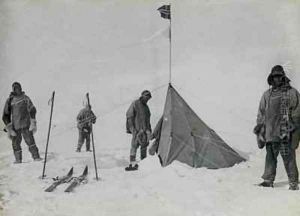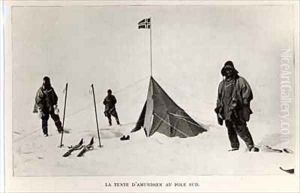Lieutenant Henry Robertson ('Birdie') Bowers Paintings
Lieutenant Henry Robertson ('Birdie') Bowers was a notable Scottish polar explorer and a member of Robert Falcon Scott's ill-fated Terra Nova Expedition to the Antarctic, which took place from 1910 to 1913. Born on July 29, 1883, in Greenock, Scotland, Bowers exhibited a passion for adventure and the outdoors from a young age. His nickname 'Birdie' is said to have been due to his bird-like beak-like nose. He joined the Royal Indian Marine in 1905, serving in British India, which helped him develop his navigational skills and fostered his hardiness and resilience.
In 1910, Bowers was selected by Scott to join the Terra Nova Expedition as a member of the sledging team, despite having no previous polar experience. His role was initially to be in charge of stores and provisions, but his exceptional energy, strength, and organizational skills quickly made him an indispensable member of the team. Bowers' exceptional capacity for work and his unfailing cheerfulness under the most trying conditions made him a valuable asset to the expedition.
Bowers was one of the five men chosen by Scott for the final push to the South Pole. The group reached the pole on January 17, 1912, only to find that the Norwegian explorer Roald Amundsen had beaten them by about five weeks. The return journey became a desperate battle against extreme weather, physical exhaustion, and dwindling supplies. Bowers, along with Scott and fellow explorers Edward Wilson, Edgar Evans, and Lawrence Oates, perished on the Antarctic ice. The exact date of Bowers' death is not known, but it is believed to have been on or around March 29, 1912, when the last of the party's records ceased.
Bowers' bravery and unwavering spirit were widely recognized. He, along with the rest of the Polar Party, became a symbol of British heroism and the tragic romanticism associated with early polar exploration. His body and those of his companions were discovered eight months later by a search party. The story of their expedition and the poignant 'Scott's Last Expedition' diaries and letters they left behind have continued to fascinate and inspire subsequent generations.

